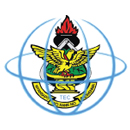A group picture of participants after the seminar.
On 21st March 2024, The Brew-Hammond Energy Center, KNUST, organised a research seminar themed ‘An Interdisciplinary Approach to Energy Network Research’ at the KNUST Engineering Education Project’s (KEEP) Boardroom.
This initiative aims to promote cross-disciplinary collaboration, encouraging individuals from various fields to unite and explore how interdisciplinary research can effectively address complex challenges within energy network research.

Dr. Oduro presents his research work on Energy Networks at the seminar.
The guest speaker, Dr. Richard Oduro, a Research Fellow at the University of Leeds and Supergen Energy Networks Hub, who is currently working on the policy and society work package of the hub’s project on Multi-Vector Energy Networks (MVEN), employs qualitative and quantitative tools for techno-economic and socio-economic analyses to assess policy and societal implications of various systems within the MVEN framework. To impact energy policy, he investigated the drivers of inefficiencies from both a technical and a political economy using Ghana's case of electricity distribution. He champions interdisciplinary research, urging individuals from diverse disciplines to unite for a more comprehensive approach to energy network research.
In his presentation, he stressed the importance of interdisciplinary research as a solution to complex problems. He emphasised the urgency of collaboration, particularly in addressing the challenges prevalent in Ghana's energy network distribution.
“Interdisciplinary research is a way of solving complex problems, especially in Ghana. Engaging in interdisciplinary collaboration, where individuals from various disciplines work together, fosters a deeper understanding of each field and its potential societal impact.”

A cross-section of participants at the seminar
He mentioned research areas such as network architecture and modelling, energy networks and climate adoption, and energy policies and regulations that can be undertaken to help improve the country’s energy networks.
In addition, he emphasised the significance of considering the current and future roles of energy networks. He articulated that collaborative efforts driven by a sense of urgency to swiftly address pressing issues, where individuals understand each other's contributions and seek common ground, are crucial for advancing interdisciplinary research.

